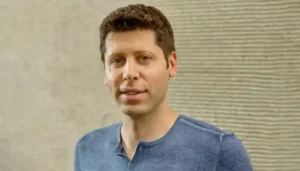OpenAI CEO Sam Altman has reignited debate around the nature of work in the artificial intelligence era, asking what truly qualifies as “real work” as AI systems increasingly automate tasks once considered essential.
Speaking at OpenAI’s DevDay conference in a conversation with AI analyst Rowan Cheung, Sam drew comparisons between traditional labor and modern desk jobs, suggesting that many contemporary roles may resemble “games to fill time” rather than life-sustaining work.
Comparing Farming to Desk Jobs
Sam’s remarks were framed around a provocative analogy: the contrast between farming, which directly sustains life, and today’s screen-based professions.
“Your job might just be a game,” he said, implying that many modern roles—filled with meetings, emails, and digital workflows—may lack the tangible impact of earlier forms of labor.
He questioned whether these jobs would still be considered “real work” if AI could perform them more efficiently.
Sam did not intend this reflection to diminish the value of current professions; instead, he aimed to highlight how AI forces society to reconsider the purpose and substance of work.
Sam’s comments suggest that as AI becomes more capable, the definition of meaningful labor may shift dramatically.
Role of AI in Redefining Work
Sam acknowledged the disruptive potential of AI, including the possibility of displacing millions of jobs.
However, he expressed confidence in humanity’s ability to adapt.
“We will find new ways to create value and purpose,” he said, emphasizing that people have historically reinvented themselves in response to technological change.
He also discussed the concept of a “zero-person billion-dollar company,” where AI agents could run operations without human involvement.
While this idea remains speculative, it underscores the transformative potential of AI in business and employment.
AI Era: Faith in Human Adaptability
Despite the challenges posed by automation, Sam remains optimistic.
He believes that people will continue to seek purpose through creativity, entrepreneurship, and collaboration.
“We’ve always found ways to adapt,” he said, pointing to past transitions from agriculture to industry to information work.
Sam’s views align with broader conversations in the tech industry about the future of employment.
As AI tools become more advanced, the emphasis may shift from task execution to value creation, emotional intelligence, and ethical decision-making—areas where human judgment remains vital.
Personal Reflections and Future Plans
Sam also shared personal insights about his own future in a world increasingly shaped by AI.
He mentioned that if AI ever becomes a better CEO of OpenAI than himself, he would gladly step aside and spend more time on his farm.
He believes that people should embrace AI as a tool for progress rather than fear it as a threat.
His remarks suggest a grounded perspective on technology’s role in society—one that balances innovation with humility and a recognition of human values.
Note: We are also on WhatsApp, LinkedIn, and YouTube to get the latest news updates. Subscribe to our Channels. WhatsApp– Click Here, YouTube – Click Here, and LinkedIn– Click Here.



